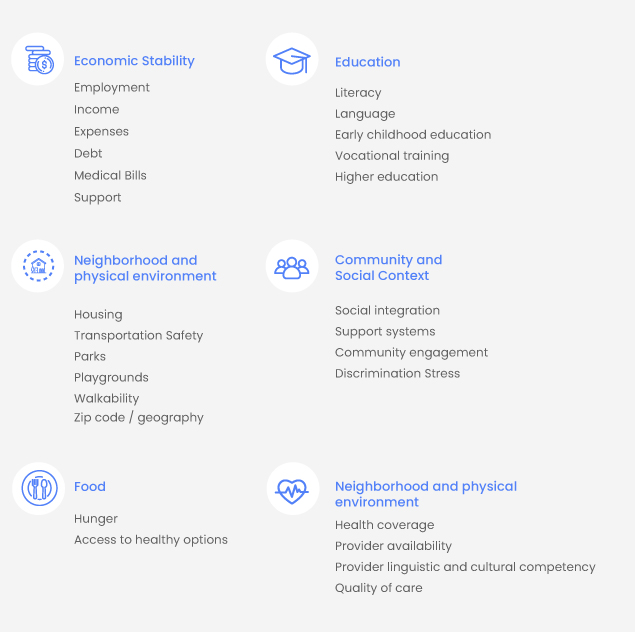Accelerating Social Determinants
Accelerating Social Determinants of Health (SDOH) to Maximize Population Health Management

Blog
Accelerating Social Determinants of Health (SDOH) to Maximize Population Health Management

Care pathway management involves various teams including the Physicians, surgeons, care navigators and others, and hence need a consistent workflow that can be accessed across the care teams.
G etting a 360-degree view of your patients’ critical health data—including the behavioral and environmental data is essential in realizing holistic healthcare benefits.
With evolving healthcare innovations like analytics, value-based care, telemedicine solutions and remote patient monitoring, care providers are increasingly leveraging the capabilities of data, analytics and insight-driven health to deliver engaging patient experiences and holistic care.
Contrary to healthcare consumer expectations, the industry has traditionally not been fully utilizing the potential of a collaborative and data-driven culture. However, getting a comprehensive view of patient data is critical in treating the patient as a whole rather than addressing just a specific health concern.
It is not just service efficiencies that can be improved using data gleaned from patient behaviors. Surprisingly, medical care contributes to just 10% to 20% of health outcomes, whereas social and other factors contribute to a staggering 80 percent to 90 percent of outcomes.
This 80 percent can again be segmented into the below aspects:
These are essentially the key factors that contribute to the Social Determinants of Health (SDOH). Various aspects including the environment in which an individual is born, grow, live behavioral and social factors, are the attributes of SDOH. Below is a detailed table on the key characteristics.

SDOH provides a tremendous opportunity to address critical patient engagement challenges and accelerate health outcomes. However, tracking and monitoring data outside the hospital walls is a major challenge. Various social and environmental factors have been reported to impact patient's health outcomes including—education, housing, income, expenses, community engagement, stress, access to healthy food options, among many others.
SDOH offers plenty of benefits to patients and providers in providing complete care. For instance, care providers can leverage these data to proactively detect possible health issues even before it occurs—enabling healthcare consumers to shift from reactive to proactive healthcare.
To maximize the value of SDOH, the data needs to be seamlessly integrated into the existing systems and workflows. However, SDOH data when documented and tracked via legacy technologies could be a significant hurdle. Lack of awareness is one of the key problems, as patients and care providers more often do not realize the potential of SDOH data in health outcomes management. Patient matching, codes and terminologies are major other factors that attribute to the complexities in documenting and streamlining SDOH data.
Interoperability is a key solution to integrating SDOH data into the hospital workflows in a frictionless manner. This comprehensive approach can empower insight-driven healthcare that can provide valuable and actionable insights at the right time.
SDOH can be leveraged at its best when both the technology and environmental challenges are addressed. Hospitals and health systems must realize the transformative benefits of Social Determinants of Health Data in overcoming significant challenges and optimizing health outcomes.
To learn more about the Social Determinants, Patient Reported Outcomes (PRO) and other insight-driven healthcare strategies, talk to our team.
From our humble beginnings as a healthcare start-up—to becoming a full-blown healthcare-exclusive digital transformation provider, our journey has been quite a remarkable one. Today, SolvEdge is a leading-edge Healthcare services and solutions provider—trusted by 450+ Hospitals, 3500+ Physicians and millions of patients across the globe.